The Narrow Gate
Jesus told His disciples that there was a "narrow gate" to enter through to be saved when His disciples questioned Him:
And He went through the cities and villages, teaching, and journeying toward Jerusalem. Then one said to Him, “Lord, are there few who are saved?” And He said to them, “Strive to enter through the narrow gate, for many, I say to you, will seek to enter and will not be able (Luke 13:22-24 NKJV).
Contrary to the gate that is narrow that leads to salvation, Jesus also said there is a wide gate that leads to hell:
Enter by the narrow gate; for wide is the gate and broad is the way that leads to destruction, and there are many who go in by it. Because narrow is the gate and difficult is the way which leads to life, and there are few who find it (Matthew 7:13-14 NKJV).

What is the Narrow Gate?
Luke describes the events of the risen Christ's days before He ascended to Heaven:
Until the day in which he was taken up, after that he through the Holy Ghost had given commandments unto the apostles whom he had chosen: To whom also he shewed himself alive after his passion by many infallible proofs, being seen of them forty days, and speaking of the things pertaining to the kingdom of God: And, being assembled together with them, commanded them that they should not depart from Jerusalem, but wait for the promise of the Father, which, saith he, ye have heard of me. For John truly baptized with water; but ye shall be baptized with the Holy Ghost not many days hence (Acts 1:2-5).
So what did Jesus teach the disciples during the forty days that He was with them prior to the Ascension? Did He teach them the narrow gate leading to heaven or the wide gate leading to hell? Yes, silly question, but having said that there are millions upon millions that are not using the narrow gate to salvation that Jesus taught His disciples. Really, the best way to answer that question is to examine the disciples "actions" i.e.” the Acts of the Apostles”, in the first century AD.
The Narrow Gate to Salvation
There are ten examples, in the Acts of the Apostles, where lost souls entered through the "narrow gate" to salvation. These are:
- Upper Room on the Day of Pentecost (Acts 2:1-4)
- First sermon of the New Covenant (Acts 2:14-41)
- Samaria (Acts 8:5-25)
- Eunuch of Ethiopia (Acts 8:26-39)
- Apostle Paul (Acts 9:1-18)
- Cornelius and household (Acts 10:1-48)
- Lydia and household (Acts 16:12-15)
- Philippian jailer and family (Acts 16:24-34)
- Crispus, his house and other Corinthians (Acts 18:8)
- John the Baptist's disciples (Acts 19:1-7)
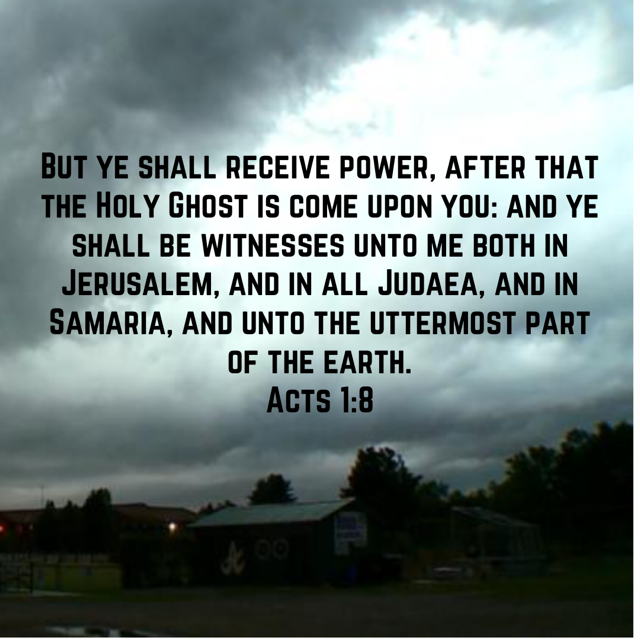
The Upper Room on the Day of Pentecost
In the upper room (Acts 1:13), about one hundred and twenty lost souls (Acts 1:15), including the disciples and Mary , the mother of Jesus (Acts 1:14), gathered and waited for the baptism of the Holy Ghost as Jesus had commanded,
And, behold, I send the promise of my Father upon you: but tarry ye in the city of Jerusalem, until ye be endued with power from on high (Luke 24:49).
and
But ye
shall receive power, after that the Holy Ghost is come upon you: and ye shall
be witnesses unto me both in Jerusalem, and in
all Judaea, and in Samaria,
and unto the uttermost part of the earth (Acts 1:8).
Let’s read about this supernatural event:
And when the day of Pentecost was fully come,
they were all with one accord in one place. And suddenly there came a sound
from heaven as of a rushing mighty wind, and it filled all the house where they
were sitting. And there appeared unto them cloven tongues like as of fire, and
it sat upon each of them. And they were all filled with the Holy Ghost, and
began to speak with other tongues, as the Spirit gave them utterance (Acts
2:1-4).
Why would anybody think that the narrow gate to heaven does not include exactly what happened in the Upper Room? Why, because the wide gate is convenient, it allows people to say:
- "I received the Holy Ghost when I was baptized as a baby."
- "I received the Holy Ghost when I accepted Jesus as my savior."
- "It automatically happens when a person is baptized."
- "That's more than grace plus nothing"
When, you ask them to show you where what they have said happened in the Bible, they can't, which makes sense because there are no examples. These untruths have been fabricated over the centuries as part of the wide gate to, supposedly heaven, but unfortunately, as Jesus said, to hell. Some who have actually read the Bible, might say something like this:
- "It is not necessary to speak in tongues, just look at Lydia, she received the Holy Ghost and never spoke in tongues.
It is true that the Bible is silent on whether Lydia spoke in tongues or not. The same is true for the Phillipian jailer and for Crispus. We will examine this response in more detail when we get to Lydia and her household.
First Sermon of the New Covenant
After God poured out His Spirit on humanity in the Upper room, the Apostle Peter preached the first sermon (Acts 2:14-41). Near the end of the sermon, the crowd was convicted:
Now when they heard this, they were pricked in their heart, and said unto Peter and to the rest of the apostles, Men and brethren, what shall we do (Acts 2:37)?
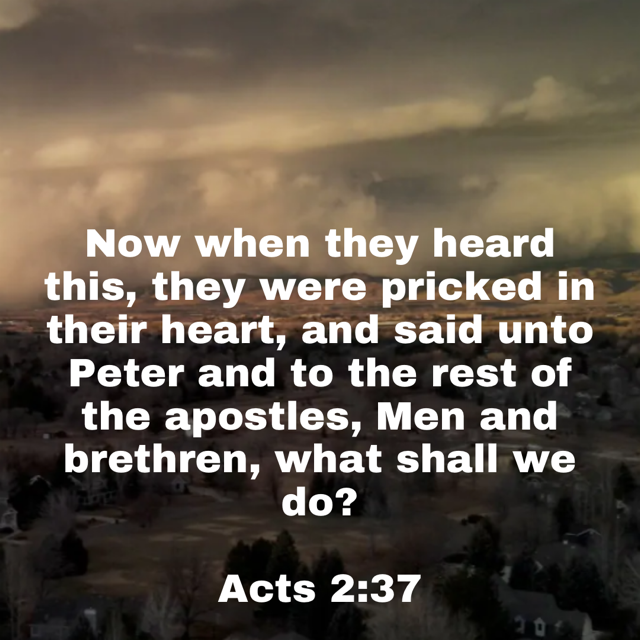
To which Peter responded:
Repent, and be baptized every one of you in the name of Jesus Christ for the remission of sins, and ye shall receive the gift of the Holy Ghost (Acts 2:38).
The narrow gate to salvation must include:
- Repentance
- Baptism for everyone in the name of Jesus Christ for the remission of sins, and
- Receiving the gift of the Holy Ghost
What happened after Peter preached this message?
Then they that gladly received his word were
baptized: and the same day there were added unto them about three thousand
souls (Acts 2:41).
This account specifically says that the "about three thousand souls" were
baptized and "added unto them". The account is silent on the
infilling of the Holy Ghost but since they were "added unto them",
one can only conclude that they had repented and received the Holy Ghost, in
the exact manner (speaking in tongues as the Spirit gave them utterance) as the first one
hundred and twenty lost souls had experienced earlier in the day.
Samaria
Within two years of the day of Pentecost, the evangelist Philip was preaching in Samaria:
And the people with one accord gave heed unto
those things which Philip spake, hearing and seeing the miracles which he did.
For unclean spirits, crying with loud voice, came out of many that were
possessed with them: and many taken with palsies, and that were lame, were
healed. And there was great joy in that city (Acts 8:6-8).
Even though the Samaritans loved the miracles and were filled with joy, Phillip kept on preaching the narrow gate to salvation and believers were baptized:
But when they believed Philip preaching the things concerning the kingdom of God, and the name of Jesus Christ, they were baptized, both men and women (Acts 8:12).
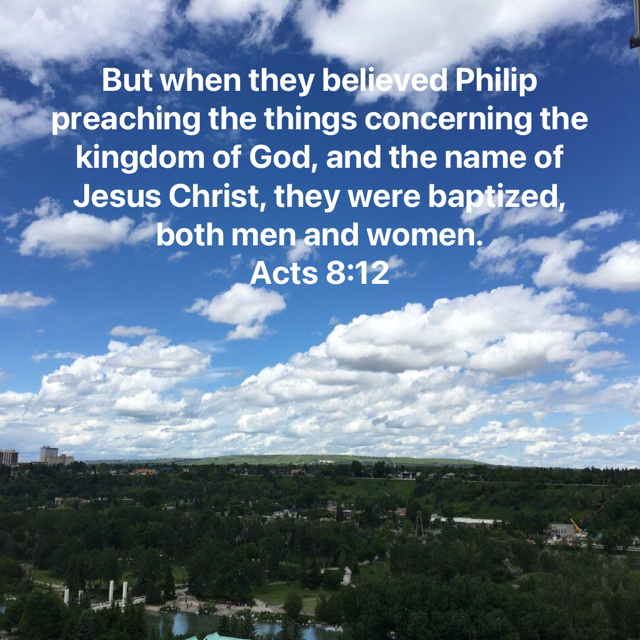
The church leaders in Jerusalem sent the Apostles Peter and John to join him:
Now when the apostles which were at Jerusalem heard that Samaria had received the word of God, they sent unto them Peter and John: Who, when they were come down, prayed for them, that they might receive the Holy Ghost: (For as yet he was fallen upon none of them: only they were baptized in the name of the Lord Jesus.) Then laid they their hands on them, and they received the Holy Ghost (Acts 8:14-16).
Watching and listening to all of these events was Simon, the sorcerer. This is significant to understand the importance of speaking in tongues when we receive the gift of the Holy Ghost, as part of the narrow gate to salvation, because,
And when Simon saw that through laying on of the apostles' hands the Holy Ghost was given, he offered them money, Saying, Give me also this power, that on whomsoever I lay hands, he may receive the Holy Ghost (Acts 8:18-19).
The obvious question is: “what did Simon see and hear that would cause him to try and buy what only God can do?” It had to be something! It's intuitively obvious - Simon saw and heard them speak in tongues as the Spirit gave utterance. What else could it possibly have been that caused Simon to react in this manner immediately after the Holy Ghost was poured out in Samaria?
Another significant fact disclosed by this account of salvation is that Peter told Simon that the Holy Ghost was a gift from God and that he needed to repent first before Jesus would give him this gift:
But Peter said unto him, Thy money perish with thee, because thou hast thought that the gift of God may be purchased with money. Thou hast neither part nor lot in this matter: for thy heart is not right in the sight of God. Repent therefore of this thy wickedness, and pray God, if perhaps the thought of thine heart may be forgiven thee. For I perceive that thou art in the gall of bitterness, and in the bond of iniquity (Acts 8:20-23).
This incident was written to make an emphatic statement - without true repentance, God will never give the precious gift of the Holy Ghost.
Obeying Acts 2:38 is absolutely necessary to enter the narrow gate to heaven.
Eunuch of Ethiopia
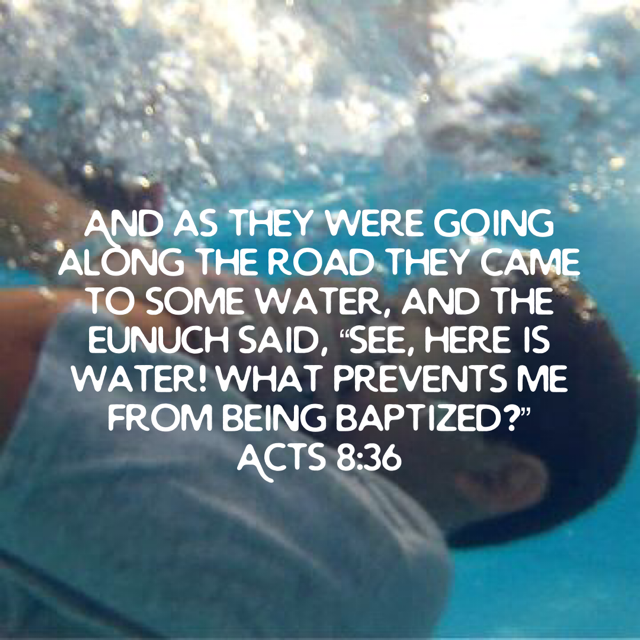
When Philip left Samaria, God gave him specific directions to return to Jerusalem (Acts 8:26). On his way he encountered a eunuch who worked for Queen Candace of Ethiopia (Acts 8:27). The eunuch was returning to Ethiopia from Jerusalem where he had been worshiping. Philip heard the eunuch reading the Bible and asked him,
... Understandest thou what thou readest (Acts
8:30)?
and the eunuch responded,
... How can I, except some man should guide
me? And he desired Philip that he would come up and sit with him (Acts 8:31).
The eunuch had been reading Isaiah 53:7, one of Isaiah's many
prophecies about Christ's crucifixion:
... He was led as a sheep to the slaughter; and
like a lamb dumb before his shearer, so opened he not his mouth: In his
humiliation his judgment was taken away: and who shall declare his generation?
for his life is taken from the earth (Acts 8:32-33).
The eunuch asked Philip to explain what he had just read, and
Then Philip opened his mouth, and began at the same scripture, and preached unto him Jesus (Acts 8:35).
Philip continued preaching as the eunuch drove the chariot until they came across water and the eunuch asked Philip,
... See, here is water; what doth hinder me to be baptized? (Acts 8:36)
and Philip said,
... If thou believest with all thine heart, thou mayest. And he answered and said, I believe that Jesus Christ is the Son of God (Acts 8:37).
The eunuch became a believer:
... and they went down both into the water, both Philip and the eunuch; and he baptized him. And when they were come up out of the water, the Spirit of the Lord caught away Philip, that the eunuch saw him no more: and he went on his way rejoicing (Acts 8:38-39).
In this description of being born again, Luke was very specific that when the eunuch was "born of water", the eunech was totally immersed in the water.
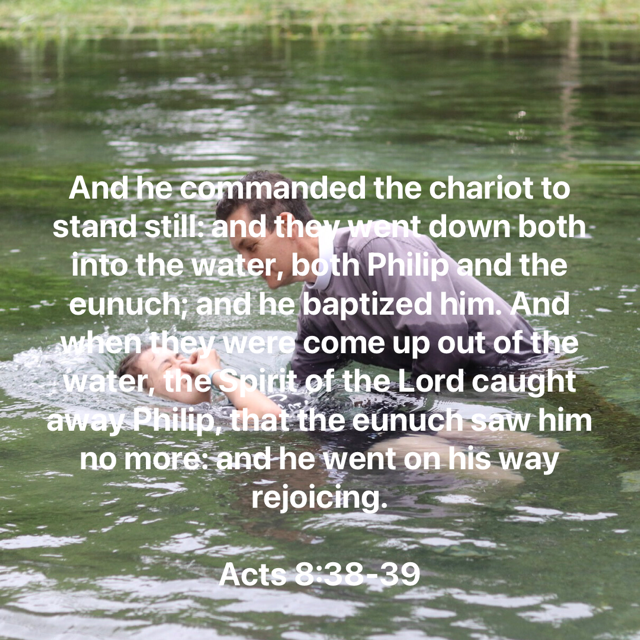
Immersion is the word used in the definition of baptism - baptizo in the Greek. The narrow gate does not include sprinkling or showering with water. In the Bible there is no evidence whatsoever that people were baptized in this manner.
Luke was silent about the eunuch being filled with the Holy Ghost, but he noted specifically that Philip was "caught away" by the Holy Ghost. In Samaria, just prior to this event, when the lost had only been baptized in the name of Jesus and had not received the gift of the Holy Ghost, Philip ensured that they were "born of the Spirit" by recruiting Peter and John to lay hands on them, as we read above.
So even though Luke was not explicit about the eunuch receiving the Holy Ghost, would it make any sense that Philip, who ensured the Samaritans were filled with the Holy Ghost, would leave without the eunuch being filled with the Holy Ghost? The scripture says the eunuch went on his way rejoicing. I have personally seen hundreds filled with the Holy Ghost, with the evidence of speaking in tongues, and they all went away rejoicing. This includes myself!
There are two other important points about the eunuch’s conversion. After Philip “preached unto him Jesus”, the eunuch recognized the need for baptism; so Philip must have been preaching Acts 2:38. Also note that after the eunuch said “I believe that Jesus Christ is the Son of God”, Philip did not tell him that because he “believed” he was saved. Instead he took him to the water and baptized him. The account does not say that the eunuch was baptized in the name of Jesus, but why would Phillip, who baptized the Samaritans that way, baptize the eunuch with any other formula. Obviously, Phillip new the narrow gate requirements of salvation.
Apostle Paul

One day on the road to Damascus, Jesus confronted Saul of Taurus,
... suddenly there shined round about him a light from heaven: And he fell to the earth, and heard a voice saying unto him, Saul, Saul, why persecutest thou me? And he said, Who art thou, Lord? And the Lord said, I am Jesus whom thou persecutest: it is hard for thee to kick against the pricks (Acts 9:3-5).
Saul was then converted to Christianity by being born again,
... that thou mightest receive thy sight, and be filled with the Holy Ghost. And immediately there fell from his eyes as it had been scales: and he received sight forthwith, and arose, and was baptized (Acts 9:17-18).
We know that Paul was baptized in Jesus' name because he said he was when he was explaining his salvation and the call that Jesus put upon his life to preach to the Gentiles (Acts 22:1-21):
And now why tarriest thou? arise, and be baptized, and wash away thy sins, calling on the name of the Lord (Acts 22:16).
His name was changed from Saul to Paul and he became the most prolific writer of Christian history. Of course, we know that the Paul spoke in tongues:
I thank my God, I speak with tongues more than ye all (1 Corinthians 14:18).
From his own direct experience with Jesus, Paul knew the very essence of the narrow gate to salvation. Why would anyone think for one moment that the Apostle Paul would not preach the narrow gate message of salvation in any other way than how he was saved?
Cornelius and Household
In this account of salvation, God gives the Apostle Peter a vision and sends Peter to Cornelius, a centurion and a gentile, who was:
A devout man, and one that feared God with all his house, which gave much alms to the people, and prayed to God alway (Acts 10:2).
This is significant verse for anyone who loves God - just because we love God and give to the poor does not mean we are saved! So Peter went to Cornelius' house and preached the Gospel of Jesus Christ,
Then Peter opened his mouth, and said, Of a truth I perceive that God is no respecter of persons (Acts 10:34).

and as he was preaching,
... the Holy Ghost fell on all them which heard the word. And they of the circumcision which believed were astonished, as many as came with Peter, because that on the Gentiles also was poured out the gift of the Holy Ghost. For they heard them speak with tongues, and magnify God...... (Acts 10:44-46).
Having experienced the narrow gate to salvation himself as well as being the Apostle who preached the Acts 2:38 message, Peter kept on preaching:
Can any man forbid water, that these should not be baptized, which have received the Holy Ghost as well as we? And he commanded them to be baptized in the name of the Lord. Then prayed they him to tarry certain days (Acts 10:47-48).
By entering the narrow gate through obedience to the Gospel of Jesus Christ, salvation was made available to the Gentiles, or as Jesus said "unto the uttermost part of the earth" (Acts 1:8).
Lydia and Household
The Apostle Paul was on his second missionary journey when the Holy Ghost instructed him to go to Macedonia (Europe) to preach the Gospel (Acts 16:10). He and the apostles with him (Silas and Luke), went to Philippi (Acts 16:12). They went to the river side their expecting to find people praying (Acts 16:13). There they met Lydia and God opened her heart to here Paul's preaching:
Lydia ... heard
us: whose heart the Lord opened, that she attended unto the things which were
spoken of Paul ... And ... she was baptized, and her household ... (Acts
16:14-15).
Lydia and her household became the first Europeans in Christian history to go through the narrow gate to be saved.
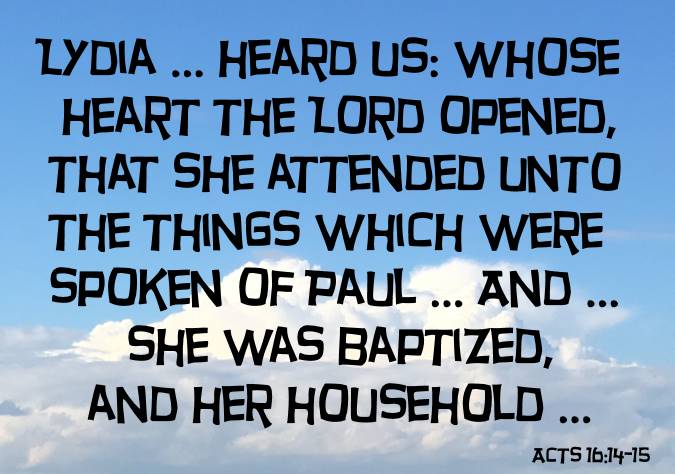
In this account of salvation, Luke was silent on the details of the baptism of the Holy Ghost but we know from Acts 16:10 that Paul was sent to preach the Gospel of Jesus Christ. From his own experience and what Jesus revealed to him on the road to Damascus, Paul new the narrow gate to salvation included repentance, baptism in the name of Jesus Christ and being filled with the Holy Ghost with the evidence of speaking in tongues. In this instance of salvation Luke was silent on being baptized in the name of Jesus and about being filled with the Holy Ghost, speaking in tongues as the Spirit gives the utterance. Why! We don't know. But what we do know is that Luke had taken the time to explain obeying the Gospel of Jesus Christ three prior times, Acts 2:1-47, Acts 8:1-25 and Acts 10:1-47. We have to ask ourselves, why would he have to tell the entire story every time someone was saved? Of course, he didn't have to. He already knew what Jesus taught and expected:
If any man have ears to hear, let him hear (Mark 4:23).
The same applies to us at this very moment. Notice that Paul baptized her when he preached the Gospel. He knew the essentiality of being baptized as soon as possible. He didn't say "we have baptismal services twice a year, come back at the next scheduled baptismal service". After I was filled with the Holy Ghost I was baptized two days later. The reason for the delay was not because my pastor didn't tell me that I needed to be baptized right away. It was my decision to be baptized at the next scheduled service.
Philippian Jailer and Family
In Philippi, Paul and Silas had been whipped and thrown into jail when the Lord intervened:
And at midnight Paul and Silas prayed, and sang praises unto God: and the prisoners heard them. And suddenly there was a great earthquake, so that the foundations of the prison were shaken: and immediately all the doors were opened, and every one's bands were loosed (Acts 16:25-26).
After Paul convinced the jailer not to take his own life, the jailer ministered to Paul's and Silas' wounds and then asked,
... Sirs, what must I do to be saved (Acts 16:30)?
Paul must have been preaching the Gospel of Jesus Christ because
the jailer
... was baptized, he and all his, straightway ... and rejoiced, believing in God with all his house (Acts 16:33-34).
Again we see that being baptized is absolutely essential. Paul, even though he had been whipped, made sure they were baptized, sometime after midnight. The narrow gate to salvation is not always convenient.
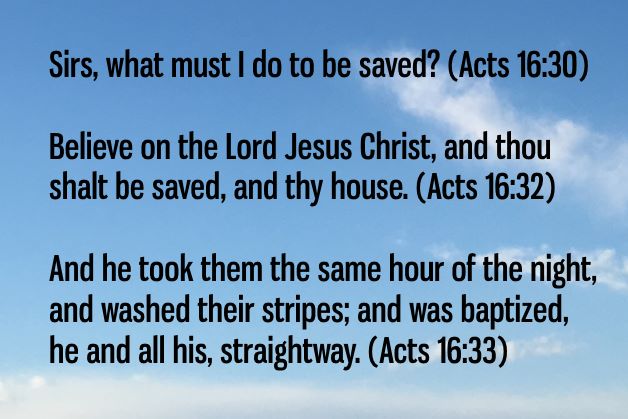
Crispus, His House and other Corinthians
The Apostle Paul left Philippi, and evangelized in Amphipolis and Apollonia, Thessalonica, Berea and Athens (Acts 17:1-34) and Corinth (Acts 18:1-17). At Corinth, after hearing Paul's preaching:
And Crispus, the chief ruler of the synagogue, believed on the Lord with all his house; and many of the Corinthians hearing believed, and were baptized (Acts 18:8).
In Paul's first letter to the Corinthians, he rebukes them for the division and quarrels within the church about the fact that some were following either himself, the Apostle Apollos, or the Apostle Peter (Cephas) when they all should have been following Jesus. He also makes known the fact that he baptized Crispus himself. Here is the scripture:
I appeal to you, brothers, by the name of our Lord Jesus Christ, that all of you agree, and that there be no divisions among you, but that you be united in the same mind and the same judgment. For it has been reported to me by Chloe's people that there is quarreling among you, my brothers. What I mean is that each one of you says, “I follow Paul,” or “I follow Apollos,” or “I follow Cephas,” or “I follow Christ.” Is Christ divided? Was Paul crucified for you? Or were you baptized in the name of Paul? I thank God that I baptized none of you except Crispus and Gaius, so that no one may say that you were baptized in my name. (I did baptize also the household of Stephanas. Beyond that, I do not know whether I baptized anyone else.) For Christ did not send me to baptize but to preach the gospel, and not with words of eloquent wisdom, lest the cross of Christ be emptied of its power (1 Corinthians 1:10-15 ESV)
Paul drove his point home when he asked them if he himself was crucified for them and if they were baptized in the name of Paul. He was reminding them that Jesus was crucified for them and that they were baptized in the name of Jesus. Paul was saying the narrow gate includes knowing that Christ died for their sins and the essentiality of being baptized in the name of Jesus. Why?
Neither is there salvation in any other: for there is none other name under heaven given among men, whereby we must be saved (Acts 4:12).
John the Baptist's Disciples
This account of conversion of John the Baptist's disciples happened on Paul's third missionary journey in Ephesus, about twenty years after Christ's crucifixion. This scripture preserves all of the aspects of the narrow gate to salvation:
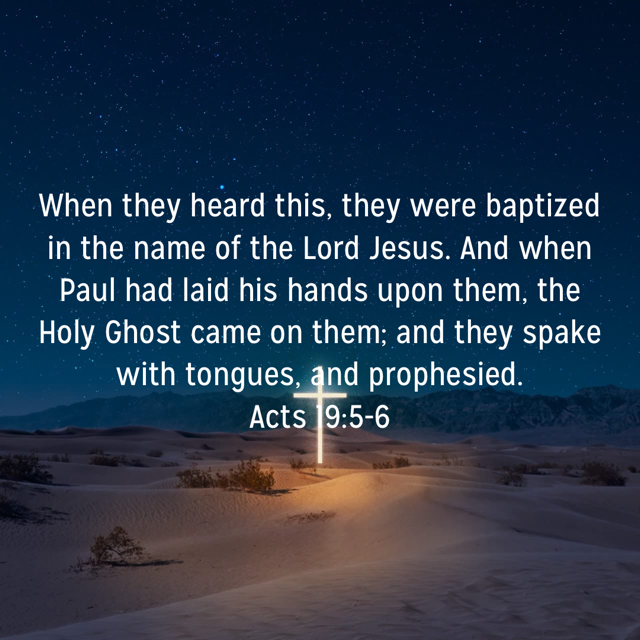
And it came to pass, that, while Apollos was
at Corinth, Paul having passed through the upper
coasts came to Ephesus:
and finding certain disciples, He said unto them, Have ye received the
Holy Ghost since ye believed? And they said unto him, We have not so much as
heard whether there be any Holy Ghost. And he said unto them, Unto what
then were ye baptized? And they said, Unto John's baptism. Then said Paul, John
verily baptized with the baptism of repentance, saying unto the people, that
they should believe on him which should come after him, that is, on Christ
Jesus. When they heard this, they were baptized in the name of the Lord
Jesus. And when Paul had laid his hands upon them, the Holy Ghost came on
them; and they spake with tongues, and prophesied. And all the men were about
twelve (Acts 19:1-7).
It is obvious, that Paul was still preaching the Gospel the same way it was preached on the day of Pentecost because these twelve disciples of John the Baptist were baptized in the name of Jesus for the remission of sins (Acts 2:38) and received the gift of the Holy Ghost with the evidence of speaking in tongues. So even though Luke was silent about the baptism of the Holy Ghost in the conversions of Lydia and her household, the Philippian jailer and his family, and Crispus and other Corinthians, this conversion is confirmation that the full Gospel of Jesus Christ was still being preached and adhered to in 53 AD.
Summary
These ten conversions from being lost to being saved occurred over a period of approximately twenty years following
Christ's death, burial and resurrection. They clearly demonstrate that the
Apostles preached the Apostoles' Doctrine. Lost souls were born again by
being obedient to the Gospel of Jesus Christ, that is, repentance, baptism in
the name of Jesus Christ for the remission of sins and receiving the gift of
the Holy Ghost, speaking with other tongues as the Spirit gives utterance.
For clarity, these recordings of salvation did not happen without repentance. As well, there was not one single baptism done in the name of the Father, the Son and the Holy Ghost or by sprinkling or pouring water onto a person. Also, when lost souls received the Holy Ghost they spoke in tongues. For further clarity there is nothing in the Bible that states that the narrow gate to heaven, the plan of salvation, would ever change from the way Peter preached it the Day of Pentecost:
Repent, and be baptized every one of you in the name of Jesus Christ for the remission of sins, and ye shall receive the gift of the Holy Ghost (Acts 2:38).
If you have not entered the narrow gate to heaven, please go to Church Directory to find a church near you that teaches and preaches this Bible truth.




